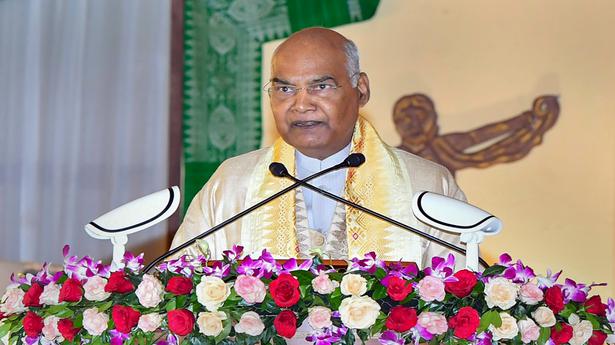
Presidential election on July 18
The Hindu
The Election Commission on June 9, 2022, announced that voting for electing India's next President w
The Election Commission on June 9, 2022, announced that voting for electing India's next President will take place on July 18, 2022. Counting of votes will be held on July 21.
Secretary-General of Rajya Sabha will be the Returning Officer, said Chief Election Commissioner Rajiv Kumar said.
The nomination papers will have to be delivered in Election Commission office, in New Delhi, and would need at least 50 members of electoral college as proposers and another 50 as seconders.
A list of electoral college will be uploaded on election commission's website. The list will be updated as there are Rajya Sabha elections before Presidential election.
The notification for the election will be issued on June 15, while the last date for nominations is June 29. The applications will be scrutinised on July 2.
This time, a total of 4,809 lawmakers, including 776 parliamentarians and 4,033 legislators will cast their votes.
Political parties cannot issue any whip to their members, Mr. Kumar said.

“Writing, in general, is a very solitary process,” says Yauvanika Chopra, Associate Director at The New India Foundation (NIF), which, earlier this year, announced the 12th edition of its NIF Book Fellowships for research and scholarship about Indian history after Independence. While authors, in general, are built for it, it can still get very lonely, says Chopra, pointing out that the fellowship’s community support is as valuable as the monetary benefits it offers. “There is a solid community of NIF fellows, trustees, language experts, jury members, all of whom are incredibly competent,” she says. “They really help make authors feel supported from manuscript to publication, so you never feel like you’re struggling through isolation.”

Several principals of government and private schools in Delhi on Tuesday said the Directorate of Education (DoE) circular from a day earlier, directing schools to conduct classes in ‘hybrid’ mode, had caused confusion regarding day-to-day operations as they did not know how many students would return to school from Wednesday and how would teachers instruct in two modes — online and in person — at once. The DoE circular on Monday had also stated that the option to “exercise online mode of education, wherever available, shall vest with the students and their guardians”. Several schoolteachers also expressed confusion regarding the DoE order. A government schoolteacher said he was unsure of how to cope with the resumption of physical classes, given that the order directing government offices to ensure that 50% of the employees work from home is still in place. On Monday, the Commission for Air Quality Management in the National Capital Region and Adjoining Areas (CAQM) had, on the orders of the Supreme Court, directed schools in Delhi-NCR to shift classes to the hybrid mode, following which the DoE had issued the circular. The court had urged the Centre’s pollution watchdog to consider restarting physical classes due to many students missing out on the mid-day meals and lacking the necessary means to attend classes online. The CAQM had, on November 20, asked schools in Delhi-NCR to shift to the online mode of teaching.









